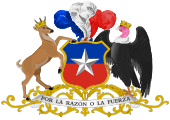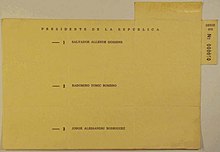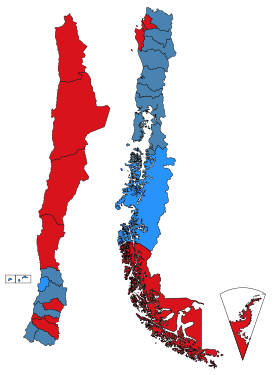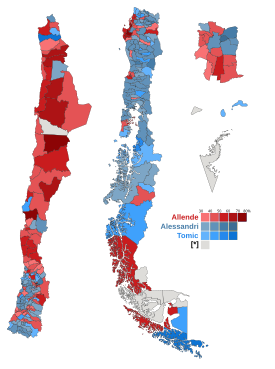
The territory of Chile has been populated since at least 3000 BC. By the 16th century, Spanish conquistadors began to colonize the region of present-day Chile, and the territory was a colony between 1540 and 1818, when it gained independence from Spain. The country's economic development was successively marked by the export of first agricultural produce, then saltpeter and later copper. The wealth of raw materials led to an economic upturn, but also led to dependency, and even wars with neighboring states. Chile was governed during most of its first 150 years of independence by different forms of restricted government, where the electorate was carefully vetted and controlled by an elite.

Salvador Guillermo Allende Gossens was a socialist politician, who served as the 28th president of Chile from 1970 until his death in 1973. As a democratic socialist committed to democracy, he has been described as the first Marxist to be elected president in a liberal democracy in Latin America.

Eduardo Nicanor Frei Montalva was a Chilean political leader. In his long political career, he was Minister of Public Works, president of his Christian Democratic Party, senator, President of the Senate, and the 27th president of Chile from 1964 to 1970. His eldest son, Eduardo Frei Ruiz-Tagle, also became president of Chile (1994–2000).

The Christian Democratic Party is a Christian democratic political party in Chile. There have been three Christian Democrat presidents in the past, Eduardo Frei Ruiz-Tagle, Patricio Aylwin, and Eduardo Frei Montalva.

The Socialist Party of Chile is a centre-left political party founded in 1933. Its historic leader was President of Chile Salvador Allende, who was deposed in a coup d'état by General Augusto Pinochet in 1973. The military junta immediately banned socialist, Marxist and other leftist political parties. Members of the Socialist party and other leftists were subject to violent suppression, including torture and murder, under the Pinochet dictatorship, and many went into exile. Twenty-seven years after the 1973 coup, Ricardo Lagos Escobar won the Presidency as the Socialist Party candidate in the 1999–2000 Chilean presidential election. Socialist Michelle Bachelet won the 2005–06 Chilean presidential election. She was the first female president of Chile and was succeeded by Sebastián Piñera in 2010. In the 2013 Chilean general election, she was again elected president, leaving office in 2018.
United States intervention in Chilean politics started during the War of Chilean Independence (1812–1826). The influence of United States in both the economic and the political arenas of Chile has since gradually increased over the last two centuries, and continues to be significant.

The Concertación, officially the Concertación de Partidos por la Democracia, was a coalition of center-left political parties in Chile, founded in 1988. Presidential candidates under its banner won every election from when military rule ended in 1990 until the conservative candidate Sebastián Piñera won the Chilean presidential election in 2010. In 2013 it was replaced by New Majority coalition.

The 1973 Chilean coup d'état was a military overthrow of the Popular Unity government in Chile led by the democratic socialist Salvador Allende as president of Chile. Allende, who has been described as the first Marxist to be democratically elected president in a Latin American liberal democracy, faced significant social unrest, political tension with the opposition-controlled National Congress of Chile, and economic warfare ordered by United States president Richard Nixon. On 11 September 1973, a group of military officers, led by General Augusto Pinochet, seized power in a coup, ending civilian rule.

Popular Unity was a left-wing political alliance in Chile that stood behind the successful candidacy of Salvador Allende for the 1970 Chilean presidential election.

Jorge Eduardo Alessandri Rodríguez was the 26th President of Chile from 1958 to 1964, and was the candidate of the Chilean right in the crucial presidential election of 1970, which he lost to Salvador Allende. He was the son of Arturo Alessandri, who was president from 1920 to 1925 and again from 1932 to 1938.

Salvador Allende was the president of Chile from 1970 until his suicide in 1973, and head of the Popular Unity government; he was a Socialist and Marxist elected to the national presidency of a liberal democracy in Latin America. In August 1973 the Chilean Senate declared the Allende administration to be "unlawful," Allende's presidency was ended by a military coup before the end of his term. During Allende's three years, Chile gradually transitioned into a socialist state.

General René Schneider Chereau was the commander-in-chief of the Chilean Army at the time of the 1970 Chilean presidential election, when he was assassinated during a botched kidnapping attempt. He coined the doctrine of military-political mutual exclusivity that became known as the Schneider Doctrine.

General elections were held in Chile on 11 December 1993 to elect the President, members of the Chamber of Deputies and elected members of the Senate. Eduardo Frei Ruiz-Tagle of the Concertación alliance was elected President, and the alliance also won a majority of seats in the Chamber of Deputies and maintained its majority in the Senate. As of 2024, this is the most recent presidential election that did not result in a runoff.
Presidential elections were held in Chile on 4 September 1964. As the constitution prevented presidents from serving two consecutive terms, incumbent president Jorge Alessandri was ineligible for re-election. The result was a victory for Eduardo Frei Montalva of the Christian Democratic Party, who received 56% of the vote.

Project FUBELT is the codename for the secret Central Intelligence Agency operations that were to prevent Salvador Allende's rise to power before his confirmation and to promote a military coup in Chile. This project came after the circumstantial failure of Track I, which involved making president Eduardo Frei Montalva interfere with the 1970 national election in opposition to Allende.

Radomiro Tomic Romero was a Chilean lawyer and politician of Croatian origin, and candidate for the presidency of the Chilean Republic in the 1970 election. He graduated as a lawyer from the Pontifical Catholic University of Chile (PUC). He began his political activity in the Social-Christian circles of the PUC, and was one of the co-founders of the Falange Nacional in 1938. He became president of the party in 1946–1947 and 1952–1953. He was married to Olaya Errázuriz Echenique, and together they had 9 children.

The Radical Party was a Chilean political party. It was formed in 1863 in Copiapó by a split in the Liberal Party. Not coincidentally, it was formed shortly after the organization of the Grand Lodge of Chile, and it has maintained a close relationship with Chilean Freemasonry throughout its life. As such, it represented the anticlericalist position in Chilean politics, and was instrumental in producing the "theological reforms" in Chilean law in the early 1880s. These laws removed the cemeteries from the control of the Roman Catholic Church, established a civil registry of births and death in place of the previous recordkeeping of the church, and established a civil law of matrimony, which removed the determination of validity of marriages from the church. Prior to these laws, it was impossible for non-Catholics to contract marriage in Chile, and meant that any children they produced were illegitimate. Non-Catholics had also been barred from burial in Catholic cemeteries, which were virtually the only cemeteries in the country; instead, non-Catholics were buried in the beaches, and even on the Santa Lucia Hill in Santiago, which, in the 19th century, functioned as Santiago's dump.

On 11 March 1990, Chile transitioned to a democracy, ending the military regime led by General Augusto Pinochet. This transition lasted 15 years. Unlike most democratic transitions led by either the elite or the people, this democratic transition process is known as an intermediate transition – a transition involving both the regime and the civil society. Throughout the transition, as the regime increased repressive violence, it simultaneously supported liberalization – progressively strengthening democratic institutions and gradually weakening that of the military.

The Presidential Republic is the period in the history of Chile spanning from the approval of the 1925 Constitution on 18 September 1925, under the government of Arturo Alessandri Palma, to the fall of the Popular Unity government headed by the President Salvador Allende on 11 September 1973. The period spans the same time as the "Development inwards" period in Chilean economic history.
The following lists events that happened during 1970 in Chile.





















